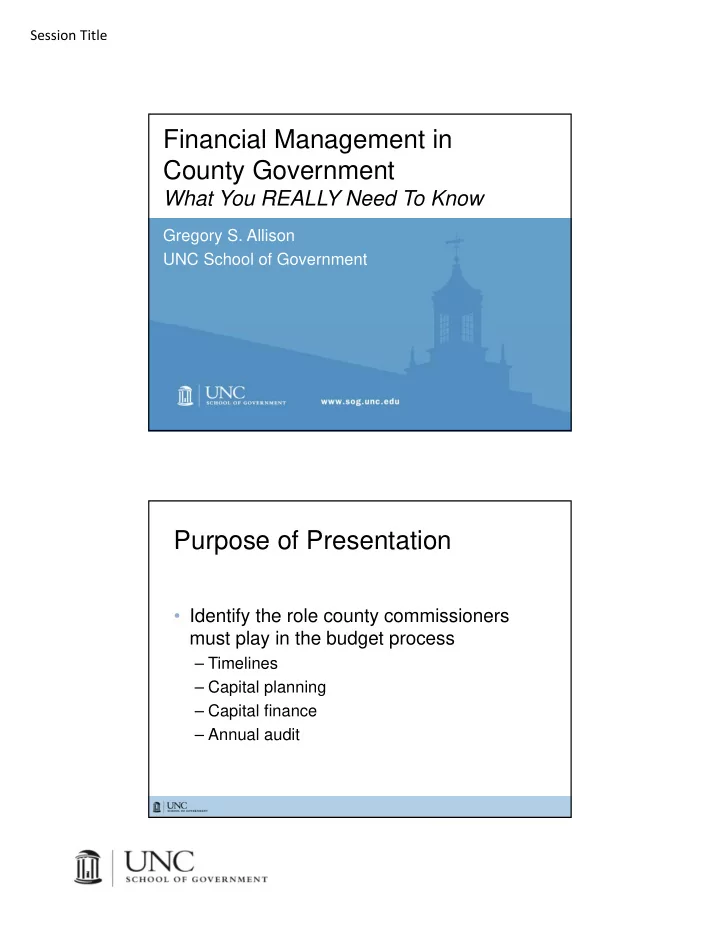

Session Title Financial Management in County Government What You REALLY Need To Know Gregory S. Allison UNC School of Government Purpose of Presentation • Identify the role county commissioners must play in the budget process – Timelines – Capital planning – Capital finance – Annual audit
Session Title The Local Government Budget & Fiscal Control Act • Board of commissioners has and shall exercise the responsibility of developing and directing the fiscal policy of the county under provisions of the Local Government Budget & Fiscal Control Act (G.S. 153A- 101). What is the LGBFCA? • State legislation that contains the fiscal requirements in which local officials must follow in regard to the multiple aspects of public budgeting and financial management (Chapter 159).
Session Title Fiscal Requirements from LGBFCA • For counties with the manager form of government, the county manager shall be the budget officer • The budget officer shall submit a proposed balanced budget to the governing board. • In each year of a revaluation, the budget officer shall include a revenue-neutral tax rate in the budget for comparison purposes. Budget Preparation and Enactment • The statutory budget calendar is budget requests to budget officer by April 30; proposed budget to governing board no later than June 1; and adopted budget ordinance on or before July 1. • Counties are required by law to adopt a balanced budget ordinance, where the sum of estimated net revenues plus appropriated fund balance equals appropriations .
Session Title Significant County Revenues • Property tax – Valuation is county responsibility and is established by January 1 for the following fiscal year. – Tax levy = (assessed value / 100) x tax rate. – The estimated percentage of collection for property taxes, which cannot exceed the current collection percentage, is multiplied by the tax levy to determine the revenue estimate for balancing the budget. Significant County Revenues (cont.) • Sales tax – County levy that is collected by state. – All counties levy a 2.0 percent sales tax – 1.5 percent is returned to county on point of delivery and 0.5 percent on per capita basis. – County shares with municipalities based on per capita or ad valorem formula.
Session Title What is Fund Balance? • Fund balance is the financial equity of a fund • Assets – Liabilities = Fund Balance • Fund balance represents potential spendable equity Why Do We Care About Fund Balance Levels? • Working capital • Emergencies • Source of capital financing • Bond rating • Balancing the budget
Session Title What is appropriable Fund Balance? • Fund balance available for appropriation equals cash and investments minus the sum of liabilities, encumbrances, and deferred revenues arising from cash receipts. Average Fund Balance Levels • Counties carry significant general fund balances. – 10 percent to 25 percent of expenditures for large counties. – 30 percent or more of expenditures for small counties.
Session Title What are Fund Balance Policies? • Local governments should adopt by resolution a fund balance policy that clearly states its percentage threshold. • Local Government Commission (LGC) recommends that fund balance should be at least 8 percent of general fund expenditures. Who is the Local Government Commission (LGC)? • The LGC, which is a division of the Department of State Treasurer, provides state oversight of North Carolina local finance.
Session Title Primary Roles of the LGC • Approves and sells local government debt. • Regulates local financial management. • Can take over local unit in financial trouble. • Sends out memos, warning letters, etc. • Provides assistance to local governments. Capital Planning and Budgeting • Local governments often use a separate process, known as capital budgeting, for acquiring major capital assets. • When the capital budget includes a multi- year forecast (5 years) of capital needs, it becomes a capital improvement program. • Predetermined criteria are commonly used to make decisions regarding capital asset (mandate, public safety, etc.)
Session Title Capital Financing Options • Pay-as-you-go financing – Annual budget – Fund balance – Capital reserve fund (G.S. 159-18) Capital Financing Options (cont.) • General obligation bonds : secured by taxing power and requires voter referendum. Commonly used for major infrastructure projects. • Revenue bonds : secured by net revenues of self-supporting enterprise and commonly used for water and sewer projects.
Session Title Capital Financing Options (cont.) • Project development bonds : secured by the revenues generated from the tax increment created from public and private development in a project development financing district. • Installment purchase financing : secured by property financed. Commonly used for infrastructure projects and large equipment. Financial Reporting and the Annual Audit • An annual audit of a local government’s financial statements is required by law. – Performed by an independent CPA – Should be completed by October 31 • Financial statements are the responsibility of management.
Session Title Financial Reporting and the Annual Audit • Purpose of an audit is to ensure that financial statements report the financial position of a local government in accordance with generally accepted accounted principles (GAAP)
Recommend
More recommend